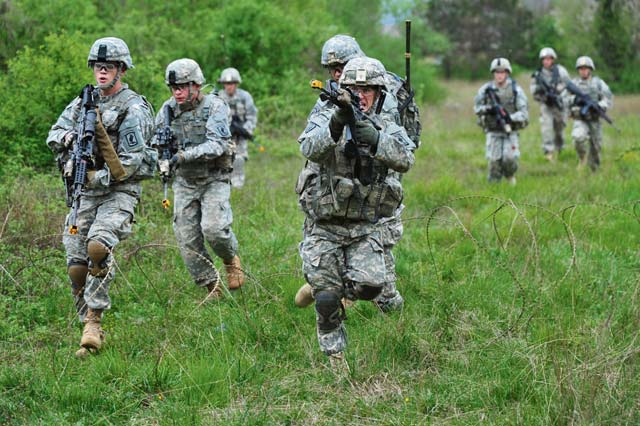
MIHAIL KOGALNICEANU AIR BASE, Romania — American and Romanian partners demonstrated their versatility, capability and resolve during operations conducted across a broad swath of Eastern Europe as well as Southwest Asia in September and October.
Mihail Kogalniceanu Air Base serves primarily as a transportation hub for Soldiers and Marines moving into and out of Afghanistan in support of Operation Enduring Freedom after the establishment of the passenger transit center in January, but the facility recently demonstrated its enduring value as a hub for a broad array of multimodal support operations.
According to key MK leaders, base facilities support troop, gear and cargo movement as well as training and security throughout the strategically vital region.
“The passenger transit mission will subside as troop levels in Afghanistan decrease,” said Col. Kevin Mulvihill, officer-in-charge of the 21st Theater Sustainment Command’s Regional Support Element. “But that doesn’t diminish the importance of the facility or the mission. This remains a vital hub for multimodal operations, regional logistics, partnership and training.
“The groundwork is already laid for effective base operations,” continued the Florida resident. “The infrastructure already includes life support, public safety, fire, police, emergency response, billeting and administrative capabilities. We’re as capable of setting conditions logistically to support regionally aligned forces, theater security cooperation and Operation Atlantic Resolve as we are of doing passenger transit.”
Key leaders of the Black Sea Area Support Team (the team conducts administrative, logistical and life support operations on MK) said their small but energetic element provides a broad array of essential services.
“The BSAST can support any (U.S. Army Europe) mission in Romania and Bulgaria,” said Col. Ron Bahr, director of the BSAST, noting that his team provides services ranging from command and control to transportation and life support to units en route to training areas in Babadag, located just north of MK, and Novo Selo in Bulgaria. Multinational training events at some five different regional bases prepare partners for successful stability and counterinsurgency as well as tactical- and operational-level combat missions.
Bahr adopted a “spoke and hub” model to describe MK’s role as a regional basing and training site.
“They arrive here, and we push them out to the smaller satellite training areas throughout the region,” the Tacoma, Washington, native said. “We provide support during reception and redeployment and more limited support during the mission itself.”
Maj. Matthew Linehan, RSE deputy, said the most prominent OAR mission involves American and Romanian paratroopers slated to conduct a combined parachute assault into the Babadag Training Area in November. Soldiers from the Vicenza, Italy-based 173rd Infantry Brigade Combat Team (Airborne) will conduct squad, platoon, company and limited battalion-level training alongside partner Romanian army paratroopers. Romanian and American soldiers will conduct weapons ranges, along with maneuver, support and integration exercises following the simulated combat jump. The 173rd “Sky Soldiers” will employ MK as a launching point for the exercise and a redeployment hub once the mission concludes.
MK’s evolving role extends beyond training and repatriation.
Support Soldiers serving at MK provide financial, mail and administrative support as required. They provide customs support from the Black Sea port city of Constanta to the base airfield. The installation, Bahr noted, plays a vital role in U.S. anti-terror and force protection planning and execution throughout Romania and Bulgaria – countries falling within the 21st TSC commanding general’s area of geographic responsibility.
U.S. personnel based at MK also support host nation partners. Americans and Romanians collaborate closely on training and logistics as well as security issues. MK leaders conduct regular coordination with diplomats and local government officials as well as military leaders, serving on relevant committees and boards as appropriate, Bahr said. Americans provide significant if modest direct support to host-nation military units, allowing use of U.S. facilities and containers, for instance. They also participate in community activities ranging from visits to area child placement centers to holiday celebrations. Indeed, Soldiers and Marines based at MK recently judged a cooking competition; results will air during a popular television culinary show in mid-November.
Above all, MK serves as an ideally situated, highly developed, well-run multimodal logistical center warmly supported by host national leaders and people alike.
“We provide cargo throughput and regional logistical support,” Bahr said. “We have a good port, good roads and a good airfield. We’re versatile.”
Mulvihill emphasized the importance of strategic position and geography as well as host national support.
“The bottom line is location matters,” he said. “As a strategic hub, we have the capability to move personnel and cargo by all methods. Whether it’s highway, rail, air or sea, you can conduct truly multimodal operations, to include the Danube inland waterway system that would allow us to barge cargo between Germany and Romania. We’re close enough to Southwest Asia where strategic airlift can come in, top off their fuel and move from there to the trouble spot. The key to that is the partnership we’ve had with the Romanians for many years – that gave us the necessary freedom of movement.”


